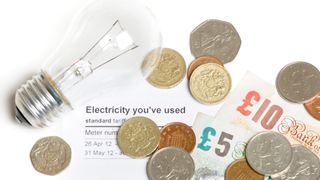The government may step in to cover the cost of our soaring energy bills
Reports suggest payments could be made to energy suppliers to help them manage the financial impact of rising costs

According to the Financial Times the UK government is exploring the option of giving money to energy suppliers when wholesale gas prices go above a ‘certain threshold’. These funds would then be used to subsidise suppliers’ increased costs, so they don’t then have to pass them on to customers in the form of higher energy bills.
This proposed initiative – known as a ‘temporary price stabilisation mechanism’ – has been met with support from a number of energy firms, and it’s believed some government sources have labelled the concept “plausible” and “logical”.
It’s also been suggested that the money could be returned by the energy suppliers when wholesale prices drop and their profits return.
More energy bill rises almost certain without any government intervention
While this proposal seems to be a step in the right direction, nothing has been formally agreed as yet and some government sources have raised concerns about it.
The FT’s report also explains that Chancellor of the Exchequer, Rishi Sunak, has claimed that should wholesale prices remain high, this funding could then ‘leave the taxpayer heavily exposed’. In addition, it’s believed the amount required to support energy suppliers could be around £20bn, and some ministers are sceptical of how effective the loans could be. One spokesperson also voiced their worries that “some of the firms would not be able to take on more credit risk”.
Amongst all this uncertainty about what to do to resolve the current energy crisis comes the seemingly certain reality that without intervention from the state, our bills will rise again this April.
This is when the new energy price cap will come into effect and in only a few weeks’ time we’ll know for sure just how much the increase will be when it's announced by Ofgem. The FT’s report predicts the cap will go from £1,277 a year to over £1,900 and it will subsequently fuel inflation at a time when taxes are going up as well.
Get daily insight, inspiration and deals in your inbox
Get the hottest deals available in your inbox plus news, reviews, opinion, analysis and more from the TechRadar team.
It’s also unlikely that the recommendation from energy suppliers and other political parties to cut VAT on domestic energy from 5% to 0% will come to fruition, after Prime Minister Boris Johnson this week referred to it as a “blunt instrument”.
What else is being considered to help UK households?
The Chancellor did say he was looking to ‘offer targeted support to poorer households’ with a possible extension of the Warm Home Discount scheme.
Outside of this Emma Pinchbeck, the chief executive of the trade body Energy UK, recently spoke to BBC Breakfast and claimed that suppliers were also discussing with the Treasury 'a mechanism to smooth out spikes in wholesale prices’ for households, stating: “the Treasury has asked industry to look at options for spreading the cost of the gas itself over a longer period of time.”
What can be done now to cut energy bills?
Alongside the aforementioned Warm Home Discount scheme, consumers struggling with their energy bills have the following options to help reduce costs:
- Checking eligibility for the Winter Fuel Payment
- Checking eligibility for the Cold Weather Payment
- Switching appliances off and not leaving them on standby mode
- Using our energy saving tips
- Being more efficient with the central heating
- Speaking with their suppliers to arrange a new payment plan
Unfortunately, we’re still at a point where running an energy comparison isn’t an option as not even the best energy deals from the UK’s best energy suppliers can better the price cap. What’s more, until something gets done to help the situation this is unlikely to change for some time, especially with the predicted price cap increase.
Rich is a freelance copywriter and content strategist with over 10 years' experience. His career has seen him work in-house and in various agencies, producing online and offline content marketing campaigns and copywriting for clients in the energy industry.
Most Popular


